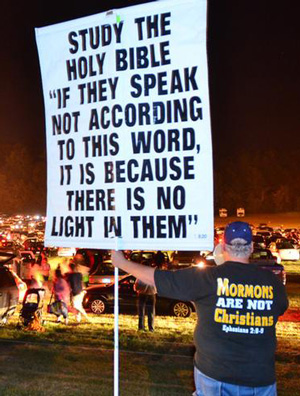This week we’re going to take a trip down Memory Lane! Each day this week I’ll be posting one of five of my favorite stories ever published here. Some are taken from books and others (like today’s) have only been published online thus far. These are some funny, some sad, some heart-warming moments from the…
Alex’s Fish Story [Memory Lane]
This week we’re going to take a trip down Memory Lane! Each day this week I’ll be posting one of five of my favorite stories ever published here. Some are taken from books (like today’s) and others have only been published online thus far. These are some funny, some sad, some heart-warming moments from the…
Living In Perfect Harmony [Church Book Excerpt]
As I mentioned here last week, I published a book on the topic of the Church, titled, There’s The Steeple… Here’s The Church—I call it “The Church Book”. As I was recently revisiting this book, I came across a chapter or two that I wanted to share again. And so that is what I’m doing…
Messes
It’s funny… I’m really not OK with messes. But, I have kids. Several. (And they are all really good at making messes!) Sometimes—after I am able to calm myself down a bit—it makes me smile just to think what a sense of humor God has. He, being all-knowing, must know that I am fairly particular…
The Amazing World We Don’t See
A friend of ours made a movie that will be in theaters this September (A Strange Brand of Happy. Go see it!) A little while ago an image appeared on the Facebook page for that movie that I really thought was the work of Photoshop. “That can’t be real!” I thought. But a quick Google…
The Need to Be Right (Can Be So Wrong!)
Somehow, through the centuries and millennia of history, religious folk have gotten the notion that the supreme goal of their spiritual pursuit is to know the right answer—to find and know the Truth. With a capital ‘T’. Certainly a goal of spiritual hunger is to find answers, enlightenment, and ‘truth’. But just what that means—”What…
Our Experience at the Hill Cumorah Pageant
“You’re all sinners! You are an abomination to God!!” These words were angrily spit at the thousands of people peacefully passing through the entrance to the Hill Cumorah Pageant’s last showing for 2013—an event which was attended by this writer and his wife. Friends of ours participated in the Pageant this year. They played various…
¿Saber, o Conocer? [Church Book Excerpt]
Several years ago I published a book containing much of the writing on the topic of the Church that I had published here up to that point. Those posts are still available in the archives, and many are still read on a weekly basis. Just the other day I was flipping through a copy of…
The Year of Jubilee
I had a run-in with the law this week. Well, it was not specifically I who did, and, it was more of a “walk-in” as opposed to a “run-in”. But that statement was generally true. If you are a regular reader of this website, you are aware that our oldest son is running a lemonade…
Bee-Do, Bee-Do
“You’re a human being, not a human doing!” Perhaps you’ve heard, or read that somewhere? I have. It’s clever, and correct—albeit somewhat cliche. A quick search of the web will confirm its ubiquitous usage.1 The reason for such widespread repeating? We tend to focus on the things we do, more than the things we are….

